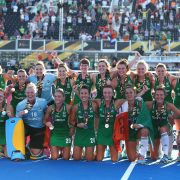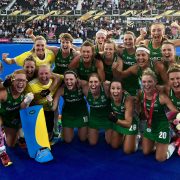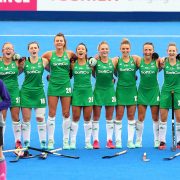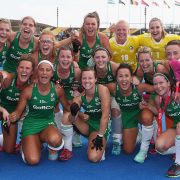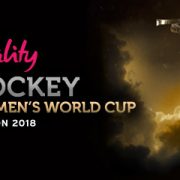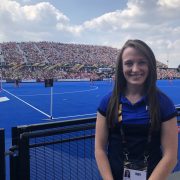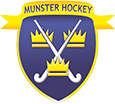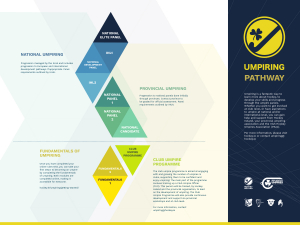Alison Keogh will take to the World Cup pitch in London this week as one of the chosen-few umpires. Below Alison talks about how she began her umpiring journey and how it has brought her to one of the biggest events in sport.
Background
I started playing at 12 as it was the primary sport of my secondary school, Loreto Beaufort in Dublin. Needless to say, having joined the sport quite late, I wasn’t very good! Despite this though I loved the game and persisted, gradually getting somewhat better and rarely missing a session. My love quickly turned to passion though when I joined my club Three Rock Rovers at 16. Three Rock quickly became a second home to me and over the next few years I made my way from 5ths to 1sts/2nds, embraced the social side of the club, met some of my closest friends, joined committees, and eventually became club captain. I have a lot to thank the club for in giving me these experiences and opportunities. Probably my most important first experience they gave me though was picking up a whistle and umpiring a game!
When I joined Three Rock, my Dad, who had umpired years beforehand, was persuaded back onto the pitch to umpire some of my games. I quickly began to question him as to why calls were being blown against me. At first this was done politely after a game, but as I began to learn the rules this quickly progressed to on-pitch questioning, which then progressed to on pitch shouting, before eventually becoming post-match rows in the car on the way home!!! Like most people, I was told that I seemed to know the rules so well as a player that I should see how it feels on the other side of the whistle. So, at 19, having never done any other games, I stepped onto a pitch to umpire the Three Rock Ladies 5ths in Division 14, and surprisingly found myself enjoying myself.
It took me a while to fully embrace umpiring as initially I didn’t want to give up playing. I umpired 3rds and 4ths club games for Three Rock intermittently before the Leinster Hockey Umpires Association began appointing me to Division 2 games. In my first year of this senior hockey I got a call one night informing me that the European Hockey Federation was running an Umpire Development Programme and that Ireland would like to put me forward if I was interested. If selected a group of young umpires would be mentored over 3 years, involving trips to watch international tournaments, practical weekends at club games in other countries and support for any questions etc., that you may have. The idea was to fast-track and support individuals to international standards. It wasn’t a decision I made lightly as I still loved playing, but I took the faith of those around me and decided to put myself forward. Thankfully I was chosen and from 2009 to 2012 I was part of the UDPs Group 4 We were brought on weekends to the Euronations, the Indoor World Cup, the EHL and practical weekends in Dublin and Glasgow. All the while during these three years I was doing less and less playing, and more and more umpiring, including my first international tournament which was the u18 Europeans in Holland in 2011. It was a gradual process but by 2012, at 24, I was umpiring every weekend.
I was awarded my FIH international badge in 2013 following the EuroNations C Division competition in Greece. By then I was doing Division 1 in Leinster, progressing to the IHL and then the EYHL when it began. Umpiring is much like driving a car though, its only when you have your license that you really learn how to drive! There are four further grades of international umpire ahead of the FIH badge, so I realised that if I wanted to go to the top, I still had a lot of work to do! Since I earned my badge I have umpired an Irish Senior Cup final, four IHL/EYHL finals, 11 u21 international matches, and 43 senior international matches. Those matches have taken place at a range of competitions and venues including the u21 Euronations in Belgium, the Junior World Cup in Chile, the Euronations in Holland, and the World League Finals in New Zealand, progressing up the ranks to the World Development Panel (the 2ndhighest rank). Listing them like that makes them sound easy but there was a lot of learning experiences and challenges in between all of those tournaments and years!
Best and worst parts
Umpiring challenges depend on where you are in your own progress, but it also depends on the game itself. Initially when I started umpiring the hardest thing was actually knowing where to stand, and what to call! I could see fouls happening, but I couldn’t work out which came first, and then often forgot to call anything at all! Needless to say some of these games weren’t enjoyable as I knew I wasn’t always being consistent, or calling the right things, and players naturally got frustrated by this. However, through listening to the advice I was given, by attending training courses, and by simply getting out on the pitch to expose myself to more games I gradually started to realise where I had to stand and how to manage situations. The higher you go, the decision making actually become easier believe it or not! But the challenges change. There’s obviously more pressure and scrutiny the higher you go so the mental side of your game becomes more important. Mistakes happen, so it’s important to make sure that you’re able to move on from it once you’ve made a mistake and not let your standards drop for the rest of the game. That can take a lot of work to get right though, it doesn’t always happen easily!
One of the questions I get asked most is why do I do this. That answer is easy! I have travelled the world and most importantly made some great friends. I can honestly say that some of the people that I have met through umpiring are some of my best friends, and are people I stay in touch with even outside of hockey. There are very few things in life that give you that sort of opportunity, let alone one that allow you do that while being involved in the sport that you love. Along with that, umpiring gives me the best seat in the house! There really is nothing like the atmosphere from a crowd as one of the worlds best players makes an attack on goal, and I feel so privileged to be a part of that.
Advice (in general/pre game/pre tournament etc.)
Regardless of what the game is though, whether its club or international, you’re always trying to do your best. In my mind the best games I have are the ones where no one talks about the umpiring! To do that I usually make sure I follow a routine. Obviously you’ve to get a good night sleep the night before a game. On the day itself I usually do a few mindfulness exercises and listen to a specific playlist to help prepare. Coffee is also a must! Pre-game, no matter how often you’ve umpired with someone, we always have a chat about how we plan to manage the game, areas of control etc., so that as a team we are on the same wave length.
In terms of tournaments, the standards for internationals are so high now that you always need to be physically prepared. We do fitness tests three times a year so obviously making sure you’re fit and strong is a critical part of your game and preparation. My gym routine is definitely one of the most important parts of my umpiring. After that, you want to make sure you’ve tested yourself before heading to a tournament. The LHUA and IHUA are great at giving me a variety of games, including mens, before tournaments as its important to get out of your comfort zone. I would usually get feedback at some of these things too so that I’m focused on what I have to work on. Internationally we have a bank of clips from previous tournaments that we can access online so it’s always important to look back over those and see how you can improve, and what you’ve done well.
Self-reflection is probably one of the things that separates the best umpires out there. It is so important to be able to look back on a game and think about why you made a decision, could you have changed anything, how it all went. If you can recognise this yourself, it means you can continually select the next steps you need to take in order to improve. Starting off, this isn’t always easy! If you’re really not sure, seek out feedback from people that are more experienced. It’s not always pleasant to hear about what you need to improve on but listen to what they say and take the time to work on it. It takes persistence and commitment but it’s the only way to keep improving.
If you’ve never umpired before and you’re worried you don’t know the rules there are always 1-2 courses in each half of the season within each province that you can attend, ask questions and clarify rules. There are plenty of us out there who are really willing to answer questions and help new people so I would definitely say to get in touch and you will be helped from there. Throughout all stages of my journey I’ve been supported so well by both the LHUA and the IHUA, with the support changing and adapting as I have. So please do get in touch! Once you attend these courses there is no experience like getting out onto a pitch so you’ll have to go and practice everything you learned but at least you will be able to do it with a bit more confidence!

